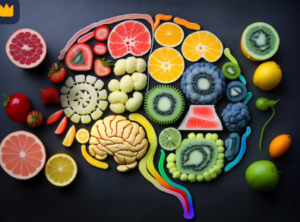Can healthy food improve brain power?

Introduction
This introductory section sets the stage for the discussion by emphasizing the brain’s critical role in governing thoughts, emotions, and actions. It raises an important question about how often we consider the quality of healthy food we provide to our brains. The introduction promises a deep exploration into the world of nutrition and its significant impact on brain performance and health.
Understanding Healthy Food and Brain Health
How the Brain Functions
This part delves into the brain’s complexity, explaining its reliance on a vast network of neurons that require constant nutritional support. It highlights how the brain’s ability to perform various cognitive tasks, from forming memories to solving problems, depends on the health of these neurons and their synaptic connections.
Nutrients essential for brain health
The focus here is on identifying specific nutrients that play a pivotal role in brain health. Omega-3 fatty acids, for instance, are crucial for maintaining the structure of neurons, while antioxidants in fruits like blueberries help protect the brain against oxidative stress. B vitamins, found in abundance in whole grains, are necessary for the synthesis of neurotransmitters, which are essential for brain communication.

The Power of Healthy Food
Impact of Diet on Brain Function
This segment explores the direct correlation between our diet and cognitive abilities. It discusses how a diet rich in essential nutrients can significantly enhance memory, attention, and processing speed. Conversely, it warns about the cognitive impairments associated with diets high in sugar and saturated fats.
Examples of Brain-Boosting Foods
In this section, readers are introduced to specific foods known for their brain health benefits. It includes walnuts for their omega-3 content, turmeric for its anti-inflammatory properties, and dark chocolate for its flavonoids that are known to enhance brain function.
Scientific Evidence
This part provides scientific backing to the discussion by referencing research that shows a strong link between diet and cognitive health. It specifically mentions the MIND diet, a hybrid of the Mediterranean and DASH diets, and its association with a reduced risk of Alzheimer’s disease.
Healthy eating habits
Incorporating healthy food into your daily diet
Here, the blog offers practical advice on how to seamlessly integrate brain-boosting foods into everyday meals. It suggests simple dietary changes and swaps that can have a significant impact on brain health.
Tips for Sustainable, Healthy food
This section shares strategies for maintaining a brain-healthy diet over the long term. It emphasises the importance of meal planning, mindful eating, and understanding food labels to make informed dietary choices.
Brain-Boosting healthy food Recipes
The blog provides delicious and nutritious recipe ideas that are beneficial for brain health. These include a spinach and walnut salad and a salmon and quinoa bowl, combining taste with nutritional value.

Lifestyle factors affecting brain health
This part expands the scope to include factors beyond diet that affect brain health, such as exercise, quality sleep, and effective stress management. It discusses how these factors are crucial in maintaining optimal brain function, with physical activity increasing blood flow to the brain and adequate sleep and stress reduction being essential for memory and learning.
Challenges and Solutions
Common Barriers to Healthy food
This section addresses typical challenges people face in maintaining a healthy diet, such as time constraints and limited food availability. It provides practical solutions to these common obstacles.
Strategies to Overcome These Challenges
Here, the blog offers tips and strategies to navigate the challenges of healthy eating, including batch cooking and finding healthy options when dining out.
Myths vs. Facts
This segment aims to debunk common myths about brain health and diet. It uses factual information to dispel popular misconceptions, such as the overestimated efficacy of ‘brain games’ compared to diet in boosting brain power.
Long-Term Benefits
The focus here is on the long-term advantages of maintaining a healthy diet. The section emphasises that a nutritious diet not only enhances brain function in the short term but also plays a significant role in preventing cognitive decline as we age.
Personal success stories
This part includes inspiring real-life stories of individuals who have made significant improvements in their cognitive health through dietary changes. These stories serve as motivation and proof of the positive impact of a healthy diet on brain function.
The Brain-Boosting Benefits of Hydration and Exercise
Hydration: A Key to Cognitive Health
This segment explains the importance of hydration for brain function, drawing parallels between the needs of a plant and our brains. It discusses how dehydration, even in its mild form, can lead to decreased concentration, memory, and cognitive abilities.
The Impact of Physical Activity on Brain Health
The blog highlights the importance of regular physical exercise as another pillar of brain health, complementing a nutritious diet.

FAQs
What is the single most important healthy food for brain health?
- While no single food can be deemed the most important, a combination of foods rich in omega-3s, antioxidants, and vitamins is key.
Can changing my diet improve my focus and concentration?
- Yes, dietary changes, especially incorporating foods rich in omega-3s and antioxidants, can improve focus and concentration.
Is it too late to improve my brain health through healthy food ?
- It’s never too late to start. Changes in diet can benefit brain health at any age.
How does hydration affect brain function?
- Adequate hydration is crucial for maintaining concentration and cognitive function, as even mild dehydration can impair these abilities.
Are ‘brain supplements’ necessary if I eat a healthy food?
- A well-balanced diet typically provides all the necessary nutrients for
- brain health, but supplements can be beneficial in certain cases. Consult a healthcare provider for personalised advice.







